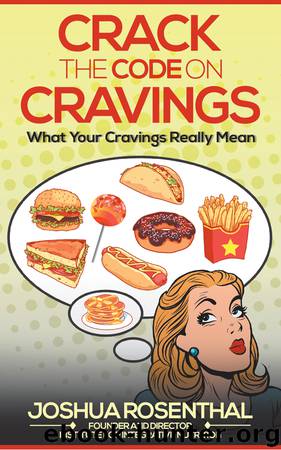Crack the Code on Cravings by Joshua Rosenthal

Author:Joshua Rosenthal [Неизв.]
Language: eng
Format: epub
ISBN: 9781941908068
Publisher: Vearsa
Published: 2010-10-27T19:00:00+00:00
The Food-Mood Connection
Have you ever noticed yourself experiencing an emotional reaction to a specific food, or have you ever had an intense emotional experience after having a meal or beverage?
One of the most unique and interesting pieces in the cravings puzzle is the link between food and mood. There’s a wealth of both scientific research and cultural evidence proving that food affects mood and vice versa, but most people still don’t acknowledge the connection. I’ve worked with people who have suffered from insomnia, mood swings, irritability, stress, low energy, depression, and intense food cravings. They tried everything to shift their emotions and feel better, but food was always the only thing that worked.
A prime example of this is the number of people I’ve worked with who really didn’t want to cook. Instead, they kept eating junky restaurant food and kept feeling terrible. However, as soon as they “gave up” and finally starting stepping into their kitchen regularly, conditions like depression and fatigue evaporated, and their whole mood lifted. How crazy is that? Food changes everything.
Yet with these clients, I knew that, in addition to altering their dietary habits, it was crucial to strengthen their mind-body connection. They each desperately needed to develop the ability to tune into their body’s messages and heal themselves. The funny thing was that, not only had those clients been unknowingly choosing foods that had extreme effects on their emotional health, but they were continuously eating these foods, exacerbating their symptoms until they were sick, tired, and frustrated.
Sadly, these cases are not uncommon. Most people consume too much junk food, which leaves them in a bad mood after the initial euphoria. Processed carbohydrates, low-quality animal products, soda, and sugar-laden snacks all contribute to fatigue and depression. Isn’t it ironic then that people tend to turn to junk for energy, comfort, and pleasure when more fruits, vegetables, and water would miraculously shift their mood and physical wellbeing? Sugar and caffeine are still heavily relied on since they provide a quick fix. But despite the temporary high and boost of energy junk food delivers, it will always be followed by an unavoidable crash. Eating junk only keeps us in the vicious cycle of being overfed and undernourished, resulting in feeling unendingly sluggish and sick.
It’s important to know that everything you eat affects you physically, mentally, and emotionally. So you can seek a solution by starting with some very simple questions: How do you feel throughout the day? Are you tired after breakfast? Are you irritable between meals? Are you stuffed and uncomfortable after dinner? How does that make you feel?
Have you ever stopped to think about the types of foods you automatically reach for in specific situations? Perhaps when you need to focus on a task, you like to eat proteins, like eggs, meat, or nuts. Or if you need some comfort after a long day, do you reach for something warm and soothing, like a hot bowl of soup? Or maybe when you’re feeling a little low, you crave chocolate or baked goods.
Download
This site does not store any files on its server. We only index and link to content provided by other sites. Please contact the content providers to delete copyright contents if any and email us, we'll remove relevant links or contents immediately.
How to Be a Bawse: A Guide to Conquering Life by Lilly Singh(7466)
Deep Work by Cal Newport(7059)
The Longevity Diet by Valter Longo(5057)
The Fat Loss Plan by Joe Wicks(4903)
The Four-Pack Revolution by Chael Sonnen & Ryan Parsons(3967)
The Ultimate Bodybuilding Cookbook by Kendall Lou Schmidt(3927)
The French Women Don't Get Fat Cookbook by Mireille Guiliano(3651)
Not a Diet Book by James Smith(3409)
Super Food Family Classics by Jamie Oliver(3400)
Factfulness_Ten Reasons We're Wrong About the World_and Why Things Are Better Than You Think by Hans Rosling(3230)
Turn Up Your Fat Burn! by Alyssa Shaffer(3213)
Self-Esteem by Matthew McKay & Patrick Fanning(3134)
Tom Kerridge's Dopamine Diet: My low-carb, stay-happy way to lose weight by Kerridge Tom(3094)
Body Love by Kelly LeVeque(3053)
The Unbecoming of Mara Dyer by Michelle Hodkin(3030)
Tone Your Tummy Type by Denise Austin(2836)
The Fat Chance Cookbook by Robert H. Lustig(2831)
LL Cool J's Platinum 360 Diet and Lifestyle by LL Cool J(2725)
Men's Health Best by Men's Health Magazine(2587)
